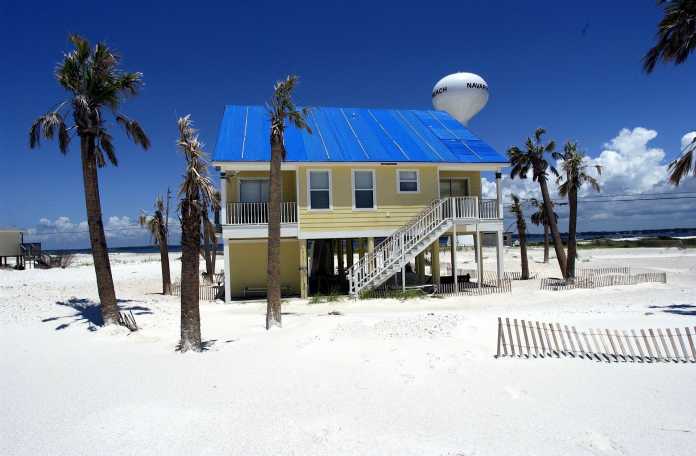Columbia University is promoting claims that climate change is putting more Americans at risk to weather disasters, but the reality is there are more disaster damages because more people are building in disaster-prone areas.
In the story, “Increasing Numbers of U.S. Residents Live in High-Risk Wildfire and Flood Zones. Why?,” Columbia University says, “In the past 20 years, flood-related disasters have cost the United States more than $845 billion in damages to homes, offices, and other infrastructure.”
Columbia then claims between 13 million and 41 million people face a 1-percent or greater risk of having their homes or business flooded in any given year. Columbia also claims millions of additional people are at risk of having their homes or businesses impacted by wildfires in any given year.
“The threat of frequent flood events is growing, thanks to climate change. And the number of people and properties at risk from climate change-related disasters — not just flooding — is growing, too,” says the story from Columbia, citing hurricanes and wildfires as other agents of disaster that climate change is making worse.
However, as documented by Climate at a Glance, floods, hurricanes, and wildfires are either relatively stable or have declined during the past 100 years of global warming.
How, then, are extreme weather events affecting more people each year?
Columbia’s story provides the answer: more and more people are moving into harm’s way each year. More people are choosing to follow their dreams and live near coasts, which are prone to hurricanes, rivers, which are prone to flooding, and forests and mountains, which are prone to wildfires.
Yet, Columbia doesn’t want to blame people for making choices which can sometimes carry high costs. Columbia quotes Alexander de Sherbinin, a senior research scientist at the Earth Institute’s Center for International Earth Science Information Network, to make this point.
“In America, we tend to say people should not have been living in these zones in the first place,” said Sherbinin. “I don’t think we can blame people who live in flood plains or those who moved to remote areas in forests that are at high risk of wildfire. That’s too simplistic.”
It is a bit simplistic, because it ignores government policies like heavily subsidized flood and hurricane insurance, and socialized firefighting efforts that encourage people to move to or locate their businesses in regions prone to natural disasters. Still, it is accurate.
“As populations grow and spread, the risk to people and property grows, creating an ‘expanding bull’s eye effect,’ Stephen Strader, an assistant professor in the department of geography and the environment at Villanova University, said during the webinar,” as Columbia reports.
Individuals’ own choices, not climate change, are responsible for the fact that people increasingly live in areas at risk of harm from extreme weather each year. Data prove this. Columbia should have stuck to reporting this fact.


















[…] Read more at Climate Realism […]
Before you move somewhere ask your preferred insurer what he thinks off it and what would be the premiums for the object you would like to move to or would like to build. Like if you want to move to a hurricane prone area the premiums may be prohibitively high. At the least you know what to expect catastrophic wise.
Insurers keep the best statistic out off business necessity.